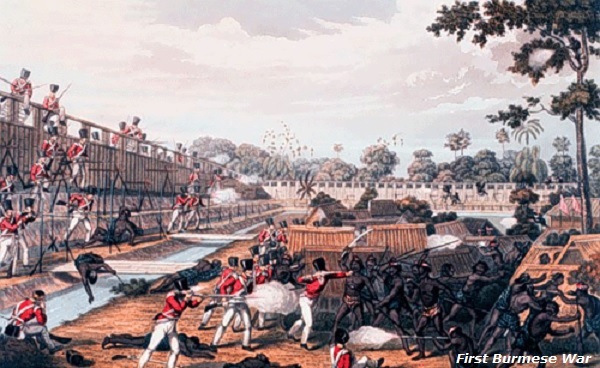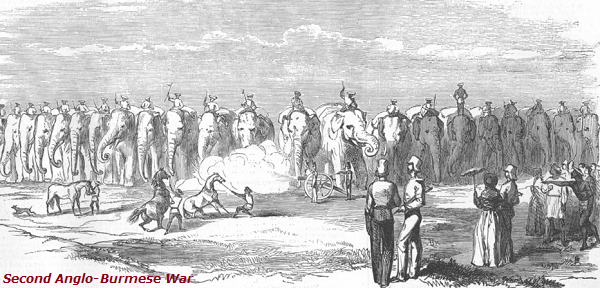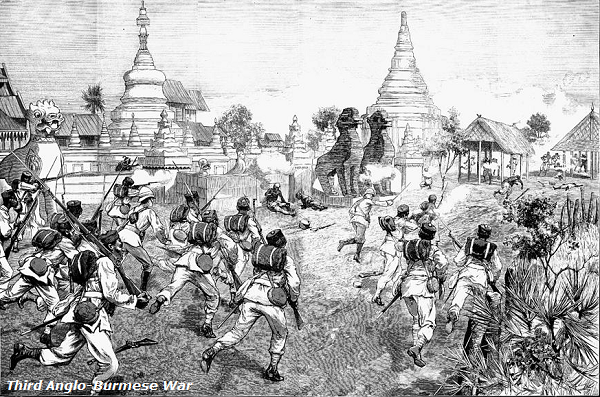
- Modern Indian History Tutorial
- Modern Indian History - Home
- Decline of Mughal Empire
- Bahadur Shah I
- Jahandar Shah
- Farrukh Siyar
- Muhammad Shah
- Nadir Shah’s Outbreak
- Ahmed Shah Abdali
- Causes of Decline of Mughal Empire
- South Indian States in 18th Century
- North Indian States in 18th Century
- Maratha Power
- Economic Conditions in 18th Century
- Social Conditions in 18th Century
- Status of Women
- Arts and Paintings
- Social Life
- The Beginnings of European Trade
- The Portuguese
- The Dutch
- The English
- East India Company (1600-1744)
- Internal Organization of Company
- Anglo-French Struggle in South India
- The British Conquest of India
- Mysore Conquest
- Lord Wellesley (1798-1805)
- Lord Hastings
- Consolidation of British Power
- Lord Dalhousie (1848-1856)
- British Administrative Policy
- British Economic Policies
- Transport and Communication
- Land Revenue Policy
- Administrative Structure
- Judicial Organization
- Social and cultural Policy
- Social and Cultural Awakening
- The Revolt of 1857
- Major Causes of 1857 Revolt
- Diffusion of 1857 Revolt
- Centers of 1857 Revolt
- Outcome of 1857 Revolt
- Criticism of 1857 Revolt
- Administrative Changes After 1858
- Provincial Administration
- Local Bodies
- Change in Army
- Public Service
- Relations with Princely States
- Administrative Policies
- Extreme Backward Social Services
- India & Her Neighbors
- Relation with Nepal
- Relation with Burma
- Relation with Afghanistan
- Relation with Tibet
- Relation with Sikkim
- Relation with Bhutan
- Economic Impact of British Rule
- Nationalist Movement (1858-1905)
- Predecessors of INC
- Indian National Congress
- INC & Reforms
- Religious & Social Reforms
- Religious Reformers
- Women’s Emancipation
- Struggle Against Caste
- Nationalist Movement (1905-1918)
- Partition of Bengal
- Indian National Congress (1905-1914)
- Muslim & Growth Communalism
- Home Rule Leagues
- Struggle for Swaraj
- Gandhi Assumes Leadership
- Jallianwalla Bagh Massacre
- Khilafat & Non-Cooperation
- Second Non-Cooperation Movement
- Civil Disobedience Movement II
- Government of India Act (1935)
- Growth of Socialist Ideas
- National Movement World War II
- Post-War Struggle
- Clement Attlee’s Declaration
- Reference & Disclaimer
Modern Indian History - Relation with Burma
The conflict between Burma and British India was initiated by border clashes. It was whiffed by the expansionist urges.
The British merchants cast avaricious glances on the forest resources of Burma and were keen to promote export of their manufactures among its people.
The British authorities also wanted to check the spread of French commercial and political influence in Burma and the rest of South-East Asia.
Through three successive wars, the independent kingdom of Burma was conquered by the British during the 19th century.
First Burmese War, 1824-26
Burma and British India developed a common frontier at the close of the 18th century when both were expanding powers.
After centuries of internal strife, Burma was united by King Alaungpaya between 1752 and 1760.
Bodawpaya, the successor of King Alaungpaya, was ruling from Ava on the river Irrawaddi repeatedly invaded Siam, repelled many Chinese invasions, and conquered the border states of Arakan (1785) and Manipur (1813) bringing Burma's border up to that of British India. Continuing his westward expansion, he threatened Assam and the Brahmaputra Valley.
In 1822, the Burmese conquered Assam. The Burmese occupation of Arakan and Assam led to continuous friction along the ill-defined border between Bengal and Burma.
The Burmese Government pressed the British authorities to take action against the insurgents (Arakanese fugitives) and to hand them over to the Burmese authorities.
The Burmese forces, chasing the insurgents, would often cross into Indian Territory. In 1823, clashes on the Chittagong Arakan frontier came to a head over the possession of Shahpuri island, which was first occupied by the Burmese and then by the British.
The Burmese proposal for neutralization of the island was rejected by the British and tension between the two began to mount.
Burmese occupation of Manipur and Assam provided another source of conflict between the two. It was looked upon by the British authorities as a serious threat to their position in India. To counter this threat they established British influence over the strategic border states of Cachar and Jaintia.
The Burmese were angered by the British action and marched their troops into Cachar. A clash between Burmese and British troops ensued, the Burmese being compelled to withdraw into Manipur.
For several decades, British Indian authorities had been trying to persuade the Government of Burma to sign a commercial treaty with them and to exclude French traders from Burma.
The British believed that the Burmese power should be broken as soon as possible, especially as they felt that British power was at the time far superior to that of the Burmese. The Burmese, on their part, did nothing to avoid war.
The Burmese rulers had been long isolated from the world and did not correctly assess the strength of the enemy. They were also led to believe that an AngloBurmese war would lead many of the Indian powers to rebel.
The war was officially declared on 24 February 1824. After an initial set-back, the British forces drove the Burmese out of Assam, Cachar, Manipur, and Arakan.
The British expeditionary forces by sea occupied Rangoon in May 1824 and reached within 45 miles of the capital at Ava.

The famous Burmese General Maha Bandula was killed in April 1825. But Burmese resistance was tough and determined. Especially effective was guerrilla warfare in the jungles.
The rainy climate and virulent diseases added to the cruelty of the war. Fever and dysentery killed more people than the war.
In Rangoon, 3,160 died in hospitals and 166 on the battlefield. In all, the British lost 15,000 soldiers out of the 40,000 they had landed in Burma.
The war was proving extremely costly (financially as well as in terms human lives), thus the British, who were winning the war, as well as the Burmese, who were losing it, were glad to make peace which came in February 1826 with the Treaty of Yandabo.
The Government of Burma agreed −
to pay one crore rupees as war compensation;
to cede its coastal provinces of Arakan and Tenasserim;
to abandon all claims to Assam, Cachar, and Jaintia;
to recognize Manipur as an independent state;
to negotiate a commercial treaty with Britain; and
to accept a British Resident at Ava while posting a Burmese envoy at Calcutta.
By this treaty, the British deprived Burma of most of its coastline, and acquired a firm base in Burma for future expansion.
Second Burmese War (1852)
If the First Burmese War was in part the result of border clashes, the second Burmese War which broke out in 1852 was almost wholly the result of British commercial greed.
British timber firms had begun to take interest in the timber resources of Upper Burma. Moreover, the large population of Burma appeared to the British to be a vast market for the sale of British cotton goods and other manufactures.
The British, already in occupation of Burma's two coastal provinces, now wanted to establish commercial relations with the rest of the country, but the Burmese Government did not permit further foreign commercial penetration.
The British merchants now began to complain of ''lack of facilities for trade" and of "oppressive treatment" by the Burmese authorities at Rangoon.
The fact of the matter was that British imperialism was at its zenith and the British believed themselves to be a superior people. British merchants had begun to believe that they had a divine right to force their trade upon others.
By the time, the aggressive Lord Dalhousie became the Governor-General of India. He was determined to heighten British imperial prestige and to push British interests in Burma.
As an excuse for armed intervention in Burma, Dalhousie took up the frivolous and petty complaint of two British sea-captains that the Governor of Rangoon had extorted neatly 1,000 rupees from them.
In November 1851, Dalhousie sent an envoy, accompanied by several ships of war, to Rangoon to demand compensation for the two British merchants.
The British envoy, Commodore Lambert, behaved in an aggressive and unwarranted manner. On reaching Rangoon, he demanded the removal of the Governor of Rangoon before he would agree to negotiate.
The Court at Ava was frightened by the show of British strength and agreed to recall the Governor of Rangoon and to investigate British complaints. But the haughty British envoy was determined to provoke a conflict. He started a blockade of Rangoon and attacked and destroyed over 150 small ships in the port.
The Burmese Government agreed to accept a British Resident at Rangoon and to pay the full compensation demanded by the British.
The Government of India now turned on the screw and pushed up their demands to an exorbitant level. They demanded the recall of the new Governor of Rangoon and also an apology for alleged insults to their envoy.
Such demands could hardly be accepted by an independent government. Obviously, the British desired to strengthen their hold over Burma by peace or by war before their trade competitors, the French or the Americans, could establish themselves there.
A full British expedition was dispatched to Burma in April 1852. This time, the war was much shorter than in 1825-26 and the British victory was more decisive.

Rangoon was immediately captured and then other important towns—Bassein, Pegu, Prome fell to the British.
Burma was at this time undergoing a struggle for 'power. The Burmese King, Mindon, who had deposed his half-brother, King Pagan Min, in a struggle for power in February 1853, was hardly in a position to fight with the British; at the same time, he could not openly 'agree to surrender Burmese territory. Consequently, there were no official negotiations for peace and the war ended without a treaty.
The British now controlled the whole of Burma's coastline and its entire seatrade.
The brunt of fighting the war was borne by Indian soldiers and its expense was wholly met from Indian revenues.
Third Burmese War (1885)
Relations between Burma and Britain remained peaceful for several years after the annexation of Pegu.
In particular, the British merchants and industrialists were attracted by the possibility of trade with China through Burma.
There was vigorous agitation in Britain and Rangoon for opening the land route to Western China. Finally, Burma was persuaded in 1862 to sign a commercial treaty by which British merchants were permitted to settle in any part of Burma and to take their vessels up the Irrawaddy River to China.
British merchants were impatient of restrictions on their trade and profits and began to press for stronger action against the Burmese Government. Many of them even demanded British conquest of Upper Burma. The king was finally persuaded to abolish all monopolies in February 1882.
Causes of Third Anglo-Burmese War
There are many other political and economic questions over which the Burmese king and the British Government clashed.
The British Government humiliated the king in 1871 by armoring that relations with him would be conducted through the Viceroy of India as if he were merely a ruler of one of the Indian states. Another source of friction was the attempt by the king to develop friendly relations with other European powers.
In 1873, a Burmese mission visited France and tried to negotiate a commercial treaty, which would also enable Burma to import modern arms, but later under British pressure, the French Government refused to ratify the treaty.
King Mindon died in 1878 and was succeeded by King Thibaw.
The British gave shelter to rival princes and openly interfered in Burma's internal affairs under the garb of preventing the alleged cruelties of King Thibaw.
The British thus claimed that they had the right to protect the citizens of Upper Burma from their own king.
Thibaw's desire to pursue his father’s policy of developing commercial and political relations with France.
In 1885, Thibaw signed a purely commercial treaty with France providing for trade. The British were intensely jealous of the growing French influence in Burma.
The British merchants feared that the rich Burmese market would be captured by their French and American rivals.
The British officials felt that an alliance with France might enable the king of Upper Burma to escape British tutelage or might even lead to the founding of a French dominion in Burma and so endanger the safety of their Indian Empire.
The French had already emerged as a major rival of Britain in South-East Asia.
In 1883, they had seized Annam (Central Vietnam), thus laying the foundation of their colony of Indo-China.
They were pushing actively towards North Vietnam, which they conquered between 1885 and 1889, and in the west towards Thailand and Burma.
The chambers of commerce in Britain and the British merchants in Rangoon now pressed the willing British Government for the immediate annexation of Upper Burma.
Immediate Cause
Only a pretext for war was needed. This was provided by the Bombay-Burma Trading Corporation, a British concern which held a lease of the teak forests in Burma.
The Burmese Government accused the Company of extracting more than double the quantity of teak contracted for by bribing local officials, and demanded compensation.
The British Government, which had already prepared a military plan for the attack on Upper Burma, decided to seize this opportunity and put forward many claims on the Burmese Government including the demand that the foreign relations of Burma must be placed under the control of the Viceroy of India.
The Burmese Government could not have accepted such demands without losing its independence. Its rejection was followed by a British invasion on 13 November 1885.

Burma as an independent country had every right to put trade restrictions on foreigners. Similarly, it had every right to establish friendly relations with France and to import arms from anywhere.
The Burmese Government was unable to put up effective resistance to the British forces. The King was incompetent, unpopular, and unprepared for war.
The country was divided by court intrigues. A condition of near civil war prevailed. King Thibaw surrendered on 28 November 1885 and his dominions were annexed to the Indian Empire soon after.
Freedom Struggle of Burma
After the First World War, a vigorous modern nationalist movement arose in Burma. A wide campaign of boycotting British goods and administration was organized and the demand for Home Rule was put forward.
The Burmese nationalists soon joined hands with the Indian National Congress.
In 1935, the British separated Burma from India in the hope of weakening the Burmese struggle for freedom. The Burmese nationalists opposed this step.
The Burmese nationalist movement reached new heights under the leadership of U Aung San during the Second World War. And, finally, Burma won its independence on 4 January 1948.